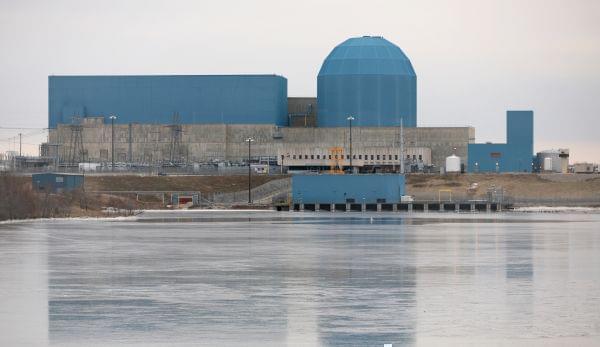Exelon Holds Out Hope For Legislative Solution

Exelon's Clinton nuclear power station, in an undated photo. (Wikimedia Commons)
When state lawmakers ended their spring session without taking action on a plan to provide aid to Exelon Corporation, there were concerns a decision to shut down two nuclear plants, including the one at Clinton, could not be reversed. But the company says there is still a chance for a legislative solution in November. It's not just clear at this point what bill would pass.
Lawmakers adjourned May 31 without approving the Next Generation Energy Plan, which would raise electric rates statewide to keep the doors open at Clinton. Governor Bruce Rauner is among the measure’s critics, calling it a "bailout."
700 jobs would be lost if the plant does shut down on June 1, 2017. Exelon has started to work with energy regulators to close down that facility, as well as the company’s Quad Cities location a year later. There have been reports the ‘point of no return’ for the plant would come by this week.
But company spokesperson Brett Nauman would only say the decision to begin the plant’s shutdown with electric grid operators would be coming "soon." He says the more time that passes, the harder it will be to reverse course.
"We’re planning to decommission the unit at this point," Nauman said. "That’s the only assumption that we can make since we didn’t get legislation in the spring session. And we know that Illinois has its plate full with budget issues, and what not, so that’s where our heads are at.”
Meanwhile, Citizens Utility Board Executive Director David Kolata wants a compromise bill that combines that measure with a separate one sought by the Illinois Clean Jobs Coalition. But he says it needs to be done in a way that protects consumers from massive rate hikes.
“Whatever you say about the nuclear plants, they are carbon free," he said. "They provide carbon-free electricity. And if something like the clean power plan goes into effect, the question needs to be – what’s the least costly way to comply with that? And this is where it gets complicated, because the nuclear plans could well play a role in that. But have to make sure that you’re doing the analysis, that you have the right framework in place.”
More recently, Exelon is seeking the backing of an unlikely supporter - Houston-based Dynegy, after the companies were at odds for months.
According to Crain’s Chicago Business, the operator of coal-fired power plants is now in talks with Exelon, with hopes of winning support of downstate lawmakers this fall. Crain's Reporter Steve Daniels discussed their negotiations on Illinois Public Media's 'The 21st' Tuesday.
Nauman admits it’s been a difficult time for the Clinton plant, saying some employees have already taken jobs at other nuclear plants.
Exelon made the decision to close those two plants after losing more than $300-million on them the last few years amid a slowing demand for power, and the declining price of natural gas.
Links
- Exelon to ‘Move Forward’ On Closure Of Clinton, Quad Cities Nuclear Plants
- Rauner & Area Officials To Meet To Discuss Exelon Proposal To Protect Clinton, QC Nuclear Plants
- Utilities Try Again For Legislation To Save Clinton Plant
- Exelon Proposal; Brexit Implications; ‘A Prairie State Of Mind’ With Larry Kanfer
- Rauner, Lawmakers React To Exelon Closures
- Exelon Defers Decision To Close Clinton Plant For One Year
- Exelon: Auctions Didn’t Help Future Of Clinton Plant

